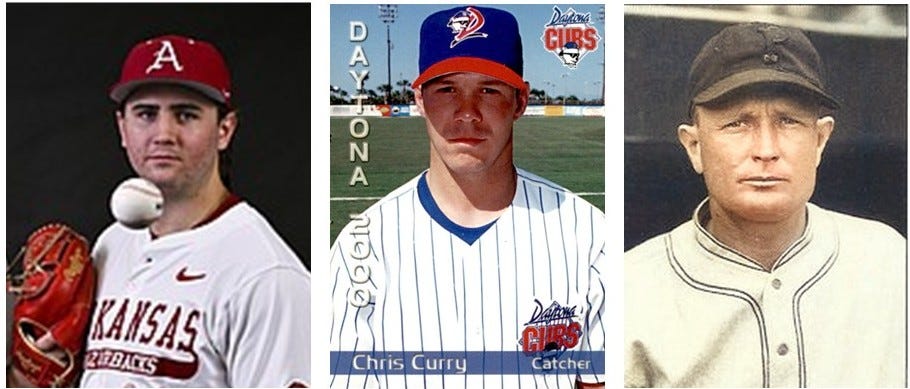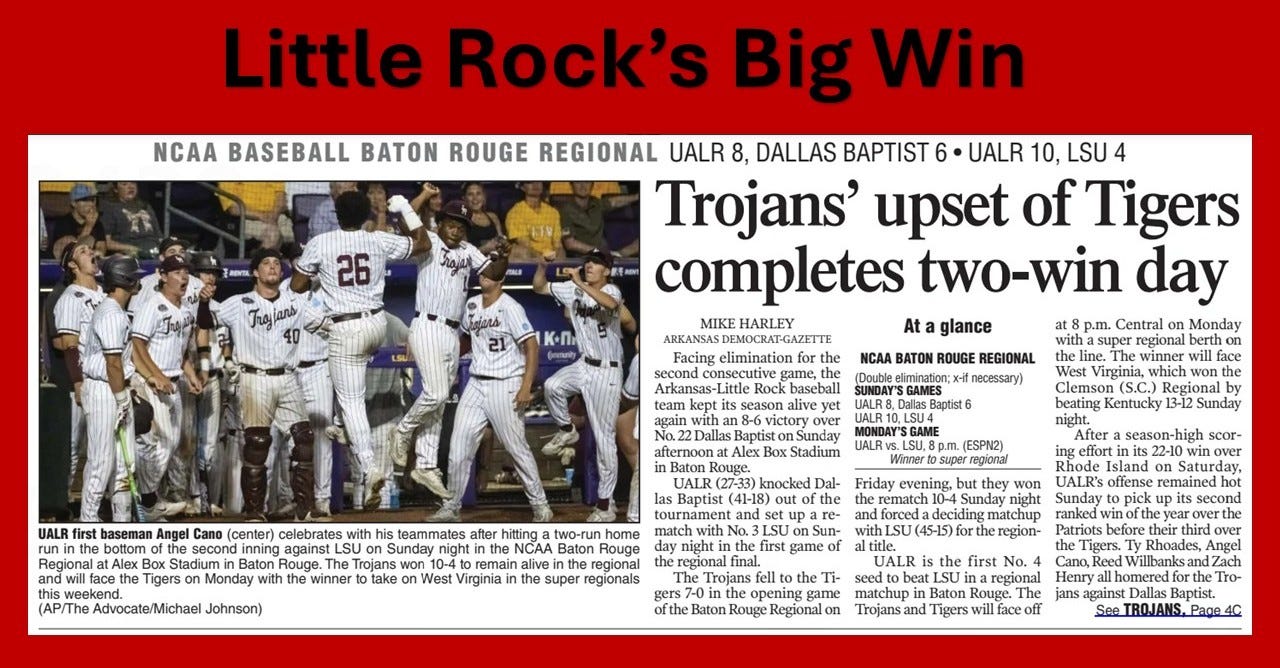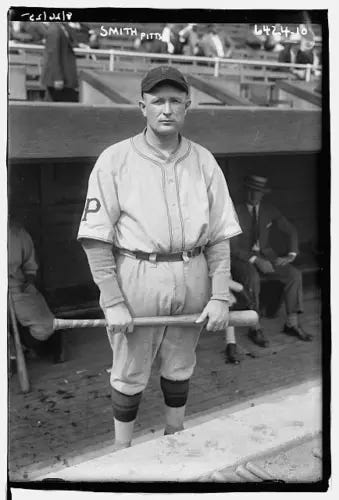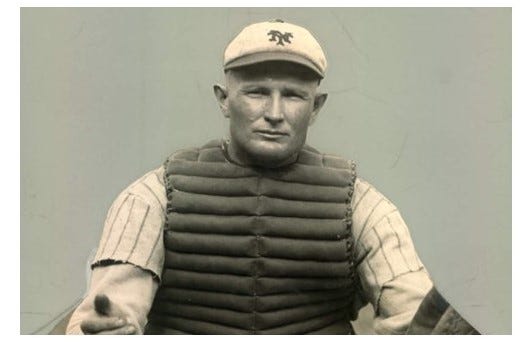Backroads and Ballplayers # 109
Stories of the famous and not-so-famous men and women from a time when baseball was "Arkansas' Game." Backroads and Ballplayers Weekly is always free and short enough to finish in one cup of coffee.
Omaha, Chris Curry’s Baseball Journey, and the “Best of the Lost” Part III: Oil Smith
OMAHA!
I am going to assume for the next few lines that most of my readers are Razorback baseball fans. I also presume that we share the excitement, joy, and pain of a season in the excruciating SEC, knowing that we will likely end our year with a loss. Not yet!
The Hogs are heading to Omaha, playing to be the one team in college baseball that doesn’t end the season with a painful loss. I am taking my cue from the players. No “dog pile.” There is still work to be done, so why not start that work with our friends from “Red Stick?”
AND…One more personal opinion. I know there are Arkansas fans who believe that when Dave Van Horn retires, Tony Vitello should be our next coach. I am not in that group. Your thoughts?
Winning isn’t everything, and these guys are playing “college” baseball. If you don’t believe the Hogs were the good guys yesterday, and their leader is a special college baseball coach, watch this news conference. Actually, everyone should watch an emotional Dave Van Horn, trying to express his feelings about this team.
Watch: Dave Van Horn and players after 11-4 win over Tennessee.
By the way, the Razorbacks are finally #1 in the often-inexplicable RPI.
Everything you want to know about the MCWS
____________________
Chris Curry, a Baseball Life

As far back as 2018, my buddy Johnny Carpenter made sure I knew about his daughter’s brother-in-law. Before he filled me in on Chris Curry as the baseball coach at Arkansas Little Rock, he always led with, “He is a good coach and a great guy.” That seems to be the prevailing opinion about the Trojans’ coach, who made national headlines last week.
Curry was making the local sports pages as early as his sophomore year at Conway High School, where he was an All-State catcher and part-time pitcher on his high school and American Legion teams. He was good enough to get big-league attention and mature enough to make calculated decisions.
The San Francisco Giants selected the recent high school grad in the 26th round of the 1996 MLB Amateur Draft. He was the 762nd player drafted, and in a million-dollar business, he was offered a few thousand to sign. Curry wisely declined. At the time of his first draft, about 160 Arkansas-born men had made the major leagues. An education was a better choice.
Curry selected Meridian Community College in Mississippi rather than bus rides on the back roads of the Giants’ farm system. Choosing the junior college route would allow Curry to move to a higher draft position or receive a major-college offer later. All of those choices materialized.
After outstanding seasons at Meridian, the Detroit Tigers selected Curry in the 1997 and 1998 drafts. Once again, he declined in favor of a college education and signed with Mississippi State in the SEC.
He led all Southeast Conference catchers in fielding percentage in the 1999 season, moved up to the ninth round of the draft, and started a pro baseball career in the Chicago Cubs organization. Curry’s time in professional baseball would span eight seasons in the minor leagues and provide another kind of “higher education” in the lab of pro baseball.
Curry played 565 professional baseball games. He played for the Emeralds, Lugnuts, Navigators, and Railcats, reaching as high as the Cubs’ AAA club in the Pacific Coast League in 2002. His last season was in Gary, Indiana, where he batted .285 and made the All-Star team in the Northern League. He would turn 29 at the end of that season. It was time to use his education to continue in the game he loved.
After working as an assistant coach at Hendrix (2007) and Arkansas Tech (2008), Curry spent two years as an assistant to Dave Van Horn in the SEC (2009, 2010). He was named the head coach back at his first college baseball home in Meridian CC in 2011, where two successful years earned him promotions to Northwestern Louisiana as pitching coach. Curry was named head coach of the UA Little Rock Trojans in 2015.
Perhaps the late-season run in the 2025 NCAA Regionals should not be a surprise, but another amazing accomplishment by a team with an experienced coach who knew how to motivate a team of receptive young men.
By 2023, Curry had established Little Rock as a successful Division I program. The Trojans finished second in the Ohio Valley Conference. Their victories included an 11-4 win over the Razorbacks in Fayetteville.
In 2024, Curry earned his third Coach of the Year award, and the Trojans won the OVC regular-season title. The 2023 and 2024 seasons were the first back-to-back winning seasons in program history in Division I.
The current chapter in the Chris Curry story made national headlines. The amazing run of the 2025 Trojans after a disappointing regular season may have come as a surprise to those who were not familiar with Chris Curry, his resilience, and his ability to motivate young men.
After losing the opening game in the Baton Rouge Regional 7-0 to LSU, the Trojans came back to win two consecutive games over Rhode Island and Dallas Baptist and a 10-4 win over the LSU Tigers in hostile territory. Little Rock got off to a 5-1 start in the deciding game before LSU came back to take the Regional title 10-6.
I expect more success for both Little Rock and Coach Chris Curry. The best is yet to come. Congratulations to the Trojans, Coach Curry, and UA Little Rock fans. You have earned the respect of the college baseball world.
___________________
A Subscription sends these weekly posts to your mailbox. There is no charge for the subscription or the Backroads and Ballplayers Weekly.
If you do not wish to subscribe, you will find the weekly posts on Monday evenings at Backroads and Ballplayers on Facebook. SAVE THE LINK…
____________________
Best of the Lost: Earl “Oil” Smith 1925
When asked to list the best Arkansas-born player who had been overlooked in Arkansas’ baseball history, I chose four guys from the first half of the 20th century. Smead Jolley, Earl Smith, Aaron Ward, and Jimmy Zinn all reached the major leagues and accomplished some remarkable things as professionals, but none of the four have been chosen as members of the Arkansas Sports Hall of Fame. I plan to highlight one year in each of their careers.
Earl Sutton Smith was born in Sheridan, Arkansas, in 1897, but after his father died when he was two, the family moved to Hot Springs to live with his grandmother. Smith grew up quickly with horsemen and ballplayers as his role models and toughness as his shield. By age 18, he was making headlines on men’s semipro teams and soliciting impromptu auditions with the pro teams holding spring training in the city.
Smith is one of those colorful baseball men whose unrestrained personality overshadowed a good career. Most of Smith’s biographies lead with stories about conflicts, suspensions, and insubordination, relegating a lifetime .300 batting average and three World Series titles to a couple of buried paragraphs. Described as one of baseball’s most notorious fighters, trash talkers, and rule breakers by his detractors, he was competitive, tough, and resourceful to his fans. Throughout a career that spanned 16 professional seasons and 1,159 games, Smith walked a thin line between combative and contemptible.
His nickname, “Oil,” came from the distinct way New Yorkers pronounced Earl, but the volatile nature of petroleum fit his demeanor perfectly. In his obituary, the Associated Press proclaimed, “He probably was involved in more fights than any player in the game and was regarded as one of the most colorful players in the golden era of sports.” Two sentences, four paragraphs down the obituary, reveal that “Smith spent 14 full seasons in the majors and batted over .300 in five of them.” New Orleans Times-Picayune 1963
After signing his first pro contract at age 19, Smith advanced quickly through three successful minor league assignments. His last stop before earning a big-league promotion was Rochester in the International League in 1918, where he hit a team-high .358.
When the Giants came calling with a contract in the spring of 1919, only a free-thinking nonconformist like Earl Smith would say, “No, thanks.” Although he had never played a big-league game, Smith declined the Giants’ first offer and declared himself a holdout before finally reaching a compromise on March 11. The New York Times proposed that “Smith is the first player who was a holdout before he even played.”
In 1919, Earl Smith not only got his first taste of big-league baseball, but he also met a baseball man as stubborn and unconventional as he was. His manager was John McGraw, a short, stocky, emotional fellow, much like Smith in both stature and temperament. The manager, known as “Little Napoleon,” decided the best way to tame his reckless young Arkansas boy was to bury him at the end of the bench.
Oil Smith appeared in only 21 games, and although the obstinate manager tried to teach his impertinent young catcher a lesson, Smith remained the untamed street kid his entire career.
In a career filled with suspensions, benchings, and fisticuffs, Smith did not play 100 games in a season until 1925, after being traded to the Pittsburgh Pirates. It would be his best year in big league baseball. Smith .313 in that first full year in Pittsburgh. The Pirates won the National League pennant and defeated the Washington Senators in the World Series. Smith batted .350 in the Fall Classic, and his constant harassment of opposing players delighted his supporters. “Nobody close to the Pirates in the historic 1925 season doubts that Smith talked opponents out of enough games to bring the pennant to Pittsburgh. In a time when sportsmanship was put aside in favor of trash talk, Oil Smith was a master of harassment.
Although 1925 was an outstanding year, ending in a World Series title. Smith’s cumulative career was excellent, despite missing several games each season to commissioner suspensions and manager benchings.
Lost in the recounting of Oil Smith’s escapades is the career of an excellent baseball player who played in a time when rural Arkansas men began to make a place in pro baseball.
He played across town in New York from Yankees second baseman Aaron Ward. The Ouachita College-educated infielder from Logan County, Arkansas, recorded the first hit by a Yankee in a new Yankee Stadium.
A few years later, 18-year-old Travis Jackson became Smith’s teammate with the Giants in late 1922. Jackson had also attended Ouachita, where he was an accomplished thespian and musician, as well as an infielder. Although Jackson and Ward hailed from Smith’s home state, they could not have been more different from the flamboyant Oil in demeanor.
Ray Powell, “The Rabbit of the Ozarks,” Smith’s teammate at Boston, and Walter Schmidt, a former coal miner from Johnson County who shared catching duties with Smith in Pittsburgh, were more in tune with the “outgoing” Smith. Both made a considerable number of sports page headlines that did not involve a baseball game.
In Smith’s last major league game, with another pennant locked up, manager Gabby Street asked him to catch the Cards’ final game of the regular season. On Sunday, September 28, 1930, Oil Smith made his last big-league appearance, catching a rookie pitcher in his first major league game. Dizzy Dean prevailed in that debut, pitching a three-hit masterpiece. Diz’s first game in the show was Smith’s last.
Earl Sutton Smith died in Hot Springs on June 8, 1963. Among Arkansas-born major leaguers with 2,500 or more plate appearances, his .303 career batting average ranks third behind Arky Vaughn and George Kell. He played in five World Series and won three series titles. In the 1925 World Series, he hit .350.
Although he was a backup catcher for much of his career, and most of his notoriety came from his confrontational nature, esteemed baseball historian Bill James once ranked Oil Smith as one of the top 100 catchers of all time. Smith would rank much higher in a list of baseball’s colorful characters.
____________________
More Arkansas baseball history and book ordering information: Link
Welcome, new subscribers. Have you missed some posts? Link












Why not consider Chris Curry for the next U of A coach? Great column!
Thanks. Great stories.
Go Hogs👍🏻⚾️🐗🐗🐗